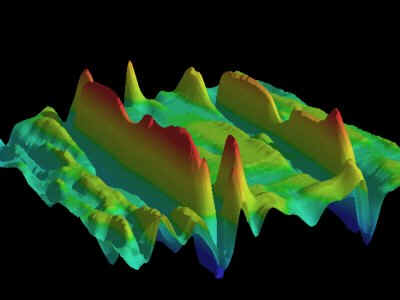The invention
- The
problem to be solved: The developed
nondestructive conductive material
testing method combines high sensitivity
magnetic field measurement with the eddy
current testing (ECT) technique. It
extends the frequency range of the ECT
down to the hundreds of Hz and makes it
suitable for the detection of the flaws
in the deep region of the material.
- Definition:
Fluxset magnetic field sensor is placed
below the exciting coil can be found in
the measuring head. The sensor is located
in the axis of the exciting coil, which
coil axis is perpendicular to the surface
of the inspected material. The exciting
coil generates magnetic field and excites
the investigated material while the
Fluxset sensor measures the response.
- Presentation:
The investigated conductive material is
excited by magnetic field. The local
variation of the conductivity due to the
effect of the flaws or any changes of the
material structure has got influence on
the eddy current distribution inside of
the material and on the magnetic field
over the surface as well. The measuring
head excites the investigated material by
inducing eddy currents in it and detects
the perturbation of the magnetic field
close to the surface. The applied sensor
measures the vector-components of the
magnetic field and provides the two or
three dimensional field map over the
scanned area.
Map
of the measured magnetic field over the surface

- Application:
Fast, touch-less, non-destructive testing
of conductive materials which has got
high conductivity and/or thick walls.
- Advantages:
This technique keeps the benefit of
the high sensitivity and spatial
resolution in the low frequency range
when the exciting magnetic field can
penetrate into the deep region of the
investigated material and can get
information about the micro flaws are
located far from the surface. The
developed probe offers significantly more
information about the perturbations of
the eddy current distribution inside the
material. It detects the vector
components of the magnetic field in each
point of the inspected specimen surface
despite of the impedance coil measurement
is based on the interaction of the
exciting-detector coil and the material,
which can get information only from about
the whole area of the detector coil. The
separation of the magnetic field
detection and the eddy current excitation
makes possible to take apart the spatial
resolution and sensitivity of the probe
from the applied frequencies for the eddy
current induction.
- Stage of
development: Prototype.
- Documentation
available: Several experimental
results, detailed description.
2. The inventor(s)
- Csaba
Sándor Daróczi, researcher,
Research Institute for Technical Physics
and Materials Science
- Antal
Gasparics, researcher, Research
Institute for Technical Physics and
Materials Science
- János
Szöllősy, developer and inventor of
the Fluxset sensor
- Gábor
Vértesy, researcher, Research
Institute for Technical Physics and
Materials Science
3. The
protection
- Form:
Exibition priority
- Priority:
May 4, 2000
- Countries
where it is in force:
4. Business
intention
licence sale
(possible co-operation, investor
participation)
5. Contact
Name: János
SZÖLLŐSY
Phone:
+36 30 924-5399
Fax:
+36 1 392 2222/1740
E-mail:
szjanos@ns.kfkipark.hu
Address:
H-1121 Budapest, Fulemule 12/7B - Hungary
|